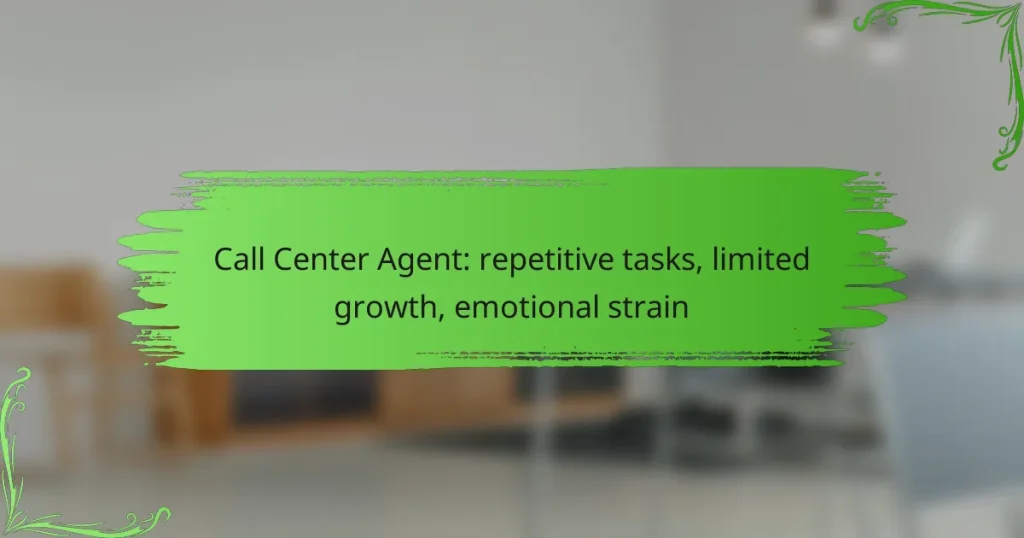Working as a call center agent often involves navigating repetitive tasks that can lead to emotional strain and limited career growth. While technology can streamline workflows and reduce monotony, agents may still face challenges in managing stress and finding advancement opportunities. Understanding these dynamics is crucial for fostering a more fulfilling and sustainable work environment.

How can call center agents reduce repetitive tasks?
Call center agents can significantly reduce repetitive tasks by leveraging technology and optimizing workflows. Implementing automation tools, AI chatbots, and streamlined CRM systems can help agents focus on more complex customer interactions and improve overall efficiency.
Automation tools like Zendesk
Automation tools such as Zendesk can help call center agents manage repetitive tasks by automating ticketing and response processes. These tools allow agents to set up predefined responses for common inquiries, reducing the time spent on routine issues.
For example, agents can create macros for frequently asked questions, enabling them to resolve customer queries in a matter of seconds instead of minutes. This not only speeds up response times but also enhances customer satisfaction.
AI chatbots for initial queries
AI chatbots can handle initial customer queries, allowing call center agents to focus on more complex issues. By using chatbots, businesses can provide instant responses to common questions, which can significantly reduce the volume of calls that agents need to handle.
These chatbots can be programmed to escalate more complicated issues to human agents, ensuring that customers receive the assistance they need without overwhelming the staff. This setup can lead to improved efficiency and lower operational costs.
Streamlined workflows with CRM systems
CRM systems help streamline workflows by centralizing customer information and interactions. This allows call center agents to access relevant data quickly, reducing the time spent searching for information during calls.
Implementing a CRM system can also facilitate better tracking of customer interactions and preferences, enabling agents to provide personalized service. This not only enhances the customer experience but also helps agents manage their time more effectively, reducing the strain of repetitive tasks.

What are the growth opportunities for call center agents?
Call center agents have several growth opportunities that can enhance their careers and job satisfaction. These paths often involve advancing to leadership roles, specializing in specific areas, or transitioning to remote positions, each offering distinct benefits and challenges.
Career advancement to team leader roles
Advancing to a team leader role is a common pathway for call center agents seeking growth. This position typically involves overseeing a group of agents, providing support, and ensuring performance targets are met. Team leaders often receive additional training in management skills and conflict resolution.
To pursue this path, agents should focus on developing strong communication and leadership skills. Demonstrating initiative and consistently meeting performance metrics can make an agent a strong candidate for promotion. Networking with current leaders and seeking mentorship can also provide valuable insights into the role.
Specialization in customer experience management
Specializing in customer experience management allows call center agents to focus on enhancing customer satisfaction and loyalty. This specialization often involves analyzing customer feedback, implementing service improvements, and training staff on best practices.
Agents interested in this area should seek additional training or certifications in customer experience strategies. Building a portfolio of successful projects can showcase their expertise and make them more attractive to employers. This specialization can lead to roles in management or consultancy, offering higher earning potential.
Transitioning to remote support positions
Transitioning to remote support positions is increasingly popular among call center agents, especially with the rise of remote work. These roles often provide more flexibility and can lead to improved work-life balance. Remote support positions may include technical support or customer service roles that can be performed from anywhere.
To make this transition, agents should familiarize themselves with remote communication tools and technologies. Highlighting experience with virtual customer interactions during job applications can enhance their chances. Additionally, agents should consider developing skills in areas like IT support or online customer engagement to broaden their opportunities in remote settings.

How can call center agents manage emotional strain?
Call center agents can manage emotional strain by implementing effective coping strategies and utilizing available resources. These approaches help mitigate stress and enhance overall well-being in a demanding work environment.
Mindfulness practices during breaks
Incorporating mindfulness practices during breaks can significantly reduce emotional strain for call center agents. Simple techniques such as deep breathing, meditation, or short walks can help clear the mind and lower stress levels.
Agents can dedicate just a few minutes during their breaks to focus on their breath or engage in guided meditation apps. This practice can improve focus and emotional resilience, making it easier to handle challenging calls.
Access to mental health resources
Having access to mental health resources is crucial for call center agents facing emotional strain. Many companies offer Employee Assistance Programs (EAPs) that provide confidential counseling and support services.
Agents should familiarize themselves with these resources and utilize them when feeling overwhelmed. Regular check-ins with a mental health professional can help manage stress and prevent burnout.
Peer support programs
Peer support programs can create a sense of community and understanding among call center agents. These programs allow agents to share experiences and coping strategies, fostering a supportive work environment.
Participating in regular group discussions or informal meet-ups can help agents feel less isolated and more connected. This camaraderie can alleviate emotional strain and promote a healthier workplace culture.

What are the common challenges faced by call center agents in major cities?
Call center agents in major cities encounter several challenges, including high call volumes, job burnout, and high turnover rates. These issues can significantly impact their performance and overall job satisfaction.
High call volumes in New York
In New York, call center agents often deal with exceptionally high call volumes, which can exceed hundreds of calls per day. This relentless pace can lead to increased stress and reduced quality of service, as agents struggle to manage customer inquiries effectively.
To cope with high call volumes, agents may need to develop efficient time management skills and utilize available technology, such as automated systems, to streamline their workflow. Prioritizing urgent calls and using call scripts can also help maintain service quality.
Job burnout in Los Angeles
Job burnout is a significant concern for call center agents in Los Angeles, where the fast-paced environment and emotional demands can lead to exhaustion. Agents often face repetitive tasks and difficult customer interactions, contributing to feelings of frustration and disengagement.
To mitigate burnout, agents should take regular breaks and engage in stress-relief activities, such as mindfulness exercises or physical activity. Employers can support their staff by providing mental health resources and fostering a positive work culture that encourages open communication.
High turnover rates in Chicago
Chicago experiences high turnover rates among call center agents, often due to the demanding nature of the job and limited growth opportunities. Many agents leave for positions that offer better career advancement or work-life balance.
To reduce turnover, call centers should focus on employee development by offering training programs and clear pathways for advancement. Implementing recognition programs to reward performance can also help retain talent and improve job satisfaction among agents.

What criteria should be considered when selecting a call center job?
When selecting a call center job, it’s crucial to evaluate the company culture, opportunities for skill development, and work-life balance policies. These factors significantly impact job satisfaction and career growth in a role often characterized by repetitive tasks and emotional strain.
Company culture and support systems
A supportive company culture can make a significant difference in a call center environment. Look for organizations that prioritize employee well-being, offer mental health resources, and foster a positive atmosphere. Engaging with current employees through reviews or informal conversations can provide insights into the company’s support systems.
Consider whether the company promotes teamwork and open communication. A culture that encourages collaboration can help mitigate the emotional strain often experienced in call center roles, making the work more manageable and enjoyable.
Opportunities for skill development
Skill development is essential for career advancement in call centers. Seek employers that provide training programs, workshops, or mentorship opportunities to enhance your abilities. This can include customer service techniques, conflict resolution, or even technical skills relevant to the industry.
Evaluate the potential for upward mobility within the organization. A company that regularly promotes from within and offers pathways to higher positions can help you grow your career while reducing the monotony of repetitive tasks.
Work-life balance policies
Work-life balance is a critical consideration when choosing a call center job. Look for companies that offer flexible scheduling, remote work options, or generous time-off policies. These benefits can help alleviate the emotional strain associated with call center work.
Assess the company’s stance on overtime and workload expectations. A reasonable approach to work hours can prevent burnout and ensure you maintain a healthy balance between your professional and personal life.


